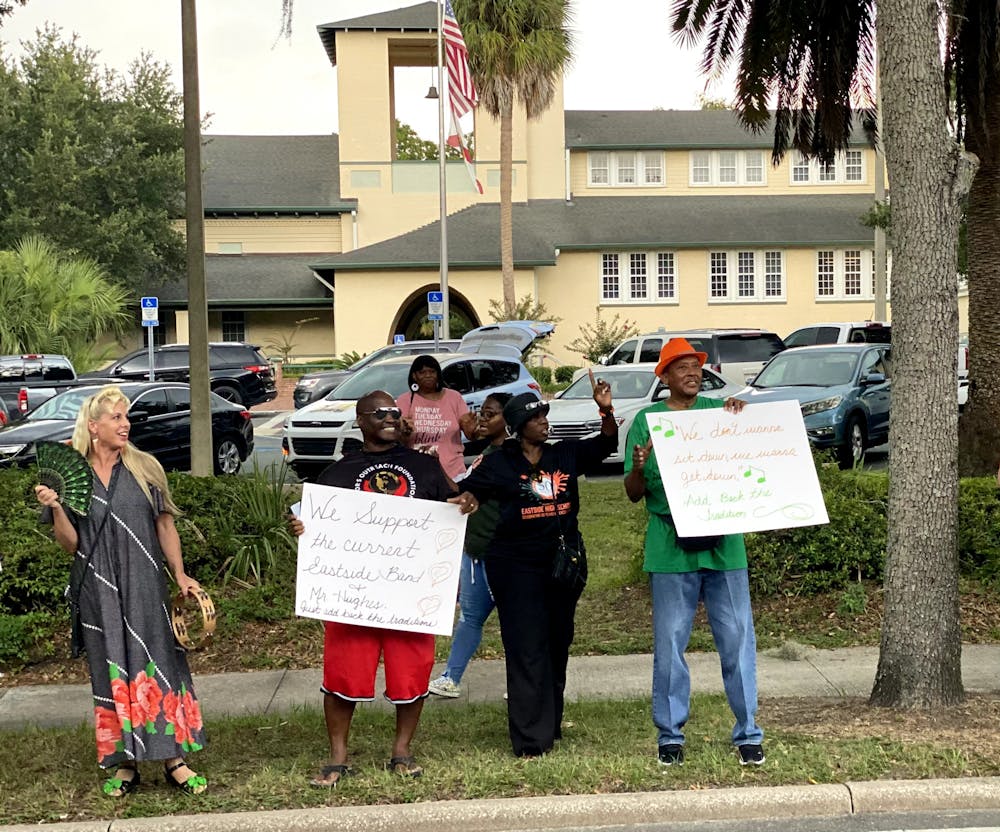Alonzo Young heard music, and his life was never the same.
Then a high school freshman and part of the first class at Eastside High in an age of public school integration, the now 66-year-old lifelong Gainesville resident said his first encounter with Richard Parker, the school’s first marching band director, altered the trajectory of his life. Young is now part of a battle to uphold his instructor’s legacy.
Young said he entered the band room upon hearing the music — either “The Horse” by Cliff Nobles and Company or Henry Mancini’s “Marlboro Country.” There stood Parker who asked the boy whether he liked the music and if he wanted to learn how to play an instrument. After answering in the affirmative, Young set out on a journey, as a trumpet player for Parker’s band, that would impact him well beyond Eastside’s band room.
“We had a connection there,” Young said. “The connection was he taught me how to play an instrument. If he had not, I will have gotten in trouble. I’ll have been probably incarcerated. I probably been on drugs. I probably been dead by now.”
Young is part of a network of Eastside marching band alumni who are concerned about its culture. They believe the band lost its traditional style of excitement associated with Historically Black Colleges and Universities and moved toward an overly sterile corps style.
About a dozen demonstrators, among them the band alumni, gathered at the Alachua County Public Schools Administration Building, located at 620 E. University Ave., Tuesday to call for a return to its original form.
Four demonstrators spoke at the Alachua County School Board meeting Tuesday about the impact Parker’s music style had on them personally and how it heralded unity in Gainesville across racial lines.
The advocates want to see Joseph Hughes, the current band director, re-incorporate the traditional style into the contemporary band.
Hughes didn’t respond to interview requests by phone and email, but told The Alligator last year Parker’s influence still hangs over the school. Leroy Williams, Eastside’s principal, also declined to comment. Eastside’s administration has resisted efforts to reintroduce the traditional style to its current band.
“We are not interested in speaking with you at this time in regards to this matter,” Williams wrote in an email.
For advocates, the debate over the marching band’s culture is not merely an issue of extracurriculars. It also embodies an erasure of Black heritage from a school thats roots are intimately tied to a critical part of Black history: the desegregation era. Alumni remembered the excitement of their performances and how their showmanship served as a joyful sense of pride for East Gainesville and the entire city.
One distinction between the widely favored corps style and the style once championed by Parker and advocated for by his students is the use of short steps, moving about eight steps forward for every five yards, in the former and high steps in the latter.
Cathy Norman, the Richard E. Parker Alumni Band’s coordinator, grew emotional during her public comment at the School Board meeting. Norman, who graduated from Eastside in 1983 and served as the school’s attendance secretary for about a decade before her retirement, said all she wishes to see are traditional elements incorporated into the modern band’s performances.
She recalls seeing the band perform at the University of Florida parade as a fifth grader and the inspiration that was set alight within her.
“I remember seeing this band with this orange and green on and the high stepping and the showmanship, the excellence,” Norman said.
Jill Dumas, a 45-year-old resident of the city and 1995 Eastside graduate, was a part of the band throughout her high school career. Before attending high school, Dumas said she grew up knowing she would be involved in the band.
Although she participated in the post-Parker era of the band, she recognizes the major impact he had on her community during desegregation in which the Eastside band began to play.
“In a time of divisiveness, Mr. Parker brought people together for a common cause and shared people’s cultures to create a culture for the community and for the school,” Dumas said.
Contact Omar Ateyah at oateyah@alligator.org. Follow him and Allie Sinkovich on Twitter @OAteyah and @allie_sinkovich.

Omar Ateyah is a third-year journalism student and the Alligator's Race and Equity reporter. He previously served as the Alligator's crime reporter and as a news assistant on the Metro Desk. He enjoys going on long, thoughtful walks.






